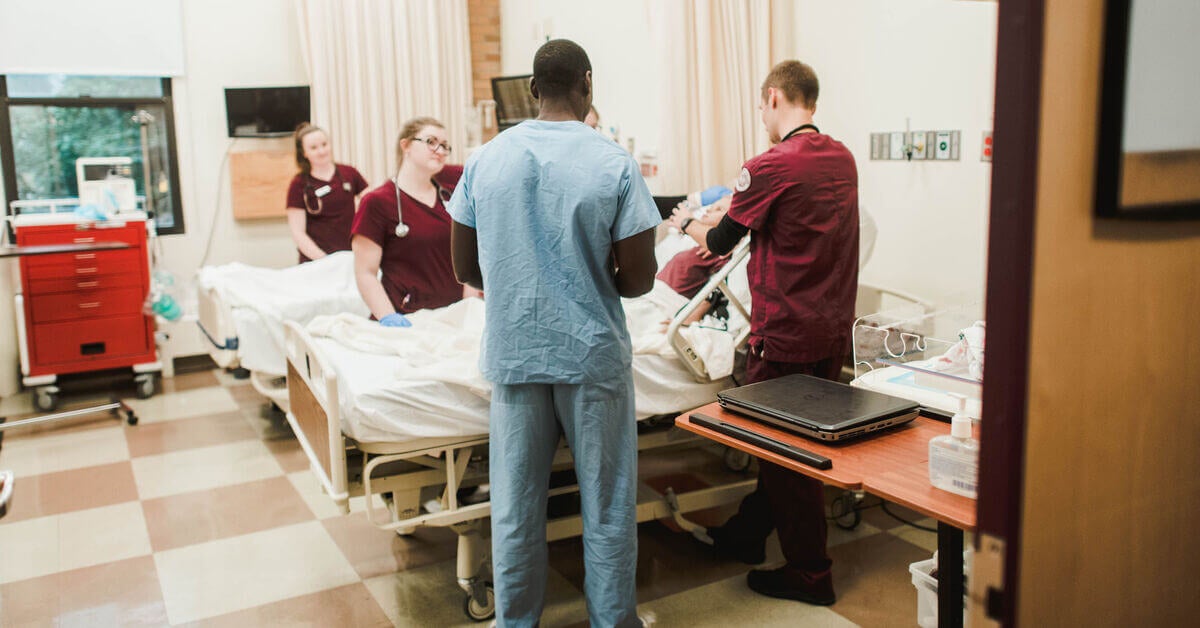What to Expect in Nursing School Clinicals
Nursing school is an exciting time when you have the chance to learn through hands-on, supervised clinical experiences. If you are eager to know what to expect in nursing school clinicals, this blog is for you. We will give an overview of what nursing clinicals are and what you should expect throughout the process as a student.
What Are Nursing Clinicals?
Nursing clinicals are a required component of nursing school when students work with a preceptor or clinical instructor in the clinical practice setting. Although students have the opportunity to learn didactic material and often prepare clinical skills in simulation or laboratory environments, nursing clinicals are a time to put the valuable information you have received in the classroom into real-world practice.
During nursing clinicals, students may have multiple rotations within different types of practice settings or populations. For example, clinical experiences may include:
- Medical-surgical nursing care
- Community health nursing
- Maternal-child nursing
- Long-term care
- Pediatrics or geriatric-focused care
- Psychiatric-mental health nursing
The goal of nursing clinicals is to expose students to the nursing process and allow teaching and learning to effectively take place. Engaging in the daily work of a nurse in a supervised, student role is an excellent way to immerse yourself in the world of nursing and even find out what you enjoy most about the profession.
There are many types of nursing careers you can pursue after graduation, and nursing school clinicals provide the chance to determine what specialty area you might find most appealing for your future career goals.
Preparing for Nursing Clinicals
One of the most important things you can do to prepare for nursing clinicals is to follow the guidance of your faculty. It is essential to dress professionally and come prepared with any required nursing equipment such as a stethoscope, penlight, scissors, or other materials that may be part of your school’s recommended materials.
As you participate in clinical experiences, you will have the opportunity to work with your classmates and learn from their experiences with patients as well. Your faculty will mentor you as you are exposed to patient care that includes a variety of common and complex health problems. You will learn how to formulate nursing diagnoses that guide the plans of care for the patients you are assigned to work with.
Another way to prepare for nursing clinicals is to brush up on your patient interviewing and history-taking skills. You will have the opportunity to interact with patients and families during your clinical experiences. This is an excellent time to gain confidence in therapeutic communication and patient education because you will be assigned patients to care for alongside the facility nursing staff and your clinical faculty.
What is Expected of Students During Nursing Clinicals?
Professionalism is always expected of nursing students when they are in the clinical setting. It is also expected that students will work to maintain the dignity of the patients and families they serve with respect and consideration in their behavior.
Timeliness is also essential. Be sure to arrive at the clinical facility or hospital when you are scheduled to begin your day and communicate with your faculty and facility staff when appropriate to notify them of any changes to your planned schedule.
Whether you participate in a traditional nursing program or an accelerated program, nursing clinicals come with assignments that may include:
- Practice documentation of patient assessments
- Clinical skill check-offs and procedures to observe and/or practice
- Evaluation of nursing competency areas by your clinical faculty and/or preceptor
- Discussions that may be online and in-person with your classmates
- Review of disease processes and appropriate nursing interventions
- Preparation and delivery of patient education
It is important to remember that while you are learning, growth and questions are expected. You can learn effectively during nursing school clinicals by:
- Taking good notes and relying on clinical pearls that your faculty share with you
- Actively engaging in patient care activities
- Volunteering to learn when opportunities arise
- Reviewing what you learned at the end of each day
Many students find that accelerated nursing programs are worth it because these programs leverage the prior education and experience of students who may be choosing nursing as a second career. These fast-paced programs are tailored for students with a non-nursing background and provide flexibility and affordability in the process of becoming a nurse.
Clinical Placement in Nursing School
If you are interested in an efficient route to transition your current career into nursing, an accelerated bachelor of science in nursing program (ABSN) may be an excellent option. Quality programs will frequently offer clinical placement services to help you secure your clinical experiences within your local area.
The clinical placement process for nursing requires that clinical facilities and potential preceptors are properly vetted to ensure the learning experience will allow students to meet the objectives of their clinical courses in the curriculum. Clinical placement services are essential so that students can maintain focus on their studies and receive guidance and support throughout the process. Once a potential preceptor and clinical site are identified, legal contracts between the school and facility are often negotiated and take some time to finalize.
If there are onboarding requirements for a student to participate in clinical experiences within an organization, these processes must be followed including the completion of immunizations and other health requirements. A nursing program that offers clinical placement services will assist with timeliness and satisfactory completion of all placement requirements so students can experience seamless transitions from classes to clinical rotations.
Excel in Nursing Clinicals at Saint Joseph’s College of Maine
If you are ready to focus on your future nursing career, Saint Joseph’s College of Maine offers a rigorous program of study with clinical placement services. Other features of the Hybrid ABSN program include:
- Online coursework in an accelerated program format
- Degree completion in approximately 15 months
- Accredited by the Commission on Collegiate Nursing Education (CCNE)
- No prior nursing experience is required
At Saint Joseph’s College of Maine, you will have access to quality faculty who are committed to helping you excel in nursing clinicals. For more information, visit the website to obtain your program guide today.


